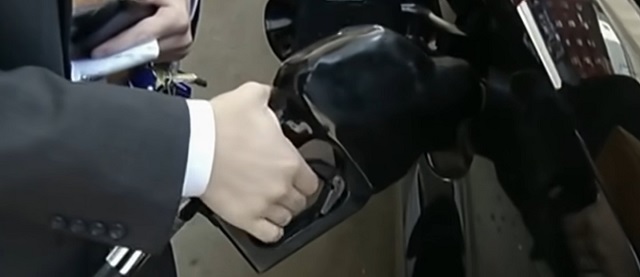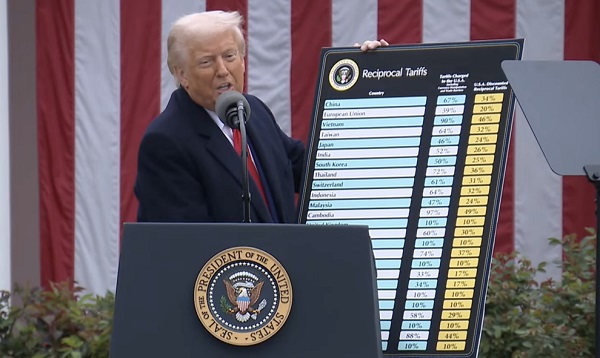Automotive
‘Save Our Cars’ Is A Winning Campaign Message In An Age Of EV Mandates

 From the Daily Caller News Foundation
From the Daily Caller News Foundation
By KEVIN MOONEY
Automobile consumers who treasure the open roads during the summertime could upend the presidential campaign and U.S. Senate races in surprising places if public opposition to electric-vehicle mandates and other regulations continues to rise.
That is what some recent polls suggest and it certainly helps to explain why the Biden administration is poised to artificially reduce fuel prices by selling one million barrels of gasoline from an energy reserve in New England timed with the summer driving season and in anticipation of the November elections.
Since the East Coast consumed in excess of three million barrels a day of gasoline last June, it is not evident that having an additional one million barrels on the market will make an appreciable difference.
Moreover, there is an argument to be made that by tapping into the reserve Team Biden is leaving the region open to cyberattacks that would disrupt energy supplies. (Recall, that is precisely what happened throughout the southeast in 2021 when a ransomware attack hit the Colonial Pipeline.)
But even in the absence of any cyber drama, the cumulative effect of President Joe Biden’s anti-energy agenda is already registering with consumers who benefit from affordable, reliable energy. This is particularly true where conventional, gas-powered cars are concerned.
On holiday weekends, cars erase differences, bring families together and improve the quality of life. The American Automobile Association (AAA) predicts almost 50 million people will travel 50 miles or more from their homes to celebrate Independence Day over the weekend of June 30 to July 4.
This would represent an increase of 3.7% from 2021 bringing travel volumes to where they were prior to the COVID-19 pandemic in 2019. This increase will be particularly acute with AAA expecting 42 million Americans to hit the roads this coming Independence Day.
But what about those EV mandates?
President Biden and California Gov. Gavin Newsom, a fellow Democrat, remain undeterred by the paucity of charging stations, the limited range of EV’s, their exorbitant costs, and the vulnerability of foreign supply chains leading back to China as they press ahead with new regulatory initiatives. Biden’s Environmental Protection Agency finalized a tailpipe emissions rule in March aimed at coercing automakers into selling more EVs while the California Air Resources Board is pressing ahead with a “zero emissions” rule the board approved last year to meet Newsom’s stated climate goals.
California is clearly working hand in glove with the Biden administration to achieve zero emissions goals for vehicles by 2035. This effort will most certainly limit consumer choice and raise costs.
Despite all the subsidies and regulatory schemes developed to favor EV’s, they represent only about 1% of the 290 million vehicles in the U.S. today. Meanwhile EV costs continue to soar.
Recent studies also show that EVs, on average, are more expensive to own and operate than their gas-powered counterparts. So how should consumers respond to the regulatory onslaught?
Enter the “Save Our Cars Coalition,” which includes 31 national and state organizations devoted to preserving the ability of consumers to select the vehicles most suitable to their needs.
Tom Pyle, president of the Institute for Energy Research, a coalition member that favors free market energy policies, views cars as an integral component of American life. The Biden-Newsom regulations amount to what Pyle describes as “an assault on American freedom.”
“In a nation as expansive as the United States, cars are not merely vehicles, they are integral to the American way of life,” Pyle says. “They play a pivotal role in our daily lives, especially in suburban and rural settings. This modern-day prohibition would outlaw a product and a value–in this case, gasoline-powered cars and trucks that have created personal mobility on an unprecedented scale – that it cannot persuade people to forego themselves.”
The coalition is perfectly positioned to make EV mandates a campaign issue in areas where the affordability of cars capable of traversing long distances without frequent stops is very much on the minds of voters. State officials who continue to double-down on California-type regulations will only serve to bolster the coalition’s arguments.
By contrast, states that break free from California’s emissions standards could become surprisingly competitive in the presidential race. Virginia Gov. Glenn Youngkin, a Republican, recently announced that he would end California’s EV mandate in his state by the end of this year. Although Virginia hasn’t backed a Republican for president since George W. Bush was re-elected in 2004, polls show Biden and Donald Trump are in a dead heat. The former, and perhaps future Republican president, is on record opposing Biden’s EV mandates.
By contrast, Gov. Phil Murphy of New Jersey, a Democrat elected in 2017 and re-elected in 2021, is moving full speed ahead with a California-type mandate requiring all new car sales to be electric by 2035. Polls show Murphy’s Jersey constituents are not keen on the policy change. In fact, more than half of state residents say they are not inclined to buy an electric car even with the mandates.
New Jersey has not voted for a Republican presidential candidate since George Bush Sr. won the state in 1988. But fresh polls show Biden leading Trump by just seven points in the Garden State. It is worth noting that New Jersey has a large block of unaffiliated voters that can be pliable in tight races such as the most recent gubernatorial campaign.
Murphy almost lost his re-election bid to Republican Jack Ciattarelli, a former assemblyman and businessman, who came within a few percentage points of pulling off an upset. Trump’s campaign rally in Wildwood, N.J., that attracted more than 100,000 people could also serve as a barometer for a potentially close election. A beach resort community, Wildwood is practically inaccessible without the kind of vehicles Biden and Newsom are attempting to ban.
The big prize though may be Pennsylvania where Trump is leading Biden in recent polls. There is also a competitive U.S. Senate race in that state between Sen. Robert Casey Jr., the Democratic incumbent, and Dave McCormick, the Republican challenger.
Polls show Casey is only ahead by six points. So far, Casey has been ducking and avoiding any questions about his position on EV mandates. With Trump already leading, and McCormick gaining in the Keystone State, anyone running on a platform of “Save Our Cars” could have a field day.
Kevin Mooney is the Senior Investigative Reporter at the Commonwealth Foundation’s free-market think tank and writes for several national publications. Twitter: @KevinMooneyDC
Automotive
Auto giant shuts down foreign plants as Trump moves to protect U.S. industry

 MxM News
MxM News
Quick Hit:
Stellantis is pausing vehicle production at two North American facilities—one in Canada and another in Mexico—following President Donald Trump’s announcement of 25% tariffs on foreign-made cars. The move marks one of the first corporate responses to the administration’s push to bring back American manufacturing.
Key Details:
-
In an email to workers Thursday, Stellantis North America chief Antonio Filosa directly tied the production pause to the new tariffs, writing that the company is “continuing to assess the medium- and long-term effects” but is “temporarily pausing production” at select assembly plants outside the U.S.
-
Production at the Windsor Assembly Plant in Ontario will be paused for two weeks, while the Toluca Assembly Plant in Mexico will be offline for the entire month of April.
-
These plants produce the Chrysler Pacifica minivan, the new Dodge Charger Daytona EV, the Jeep Compass SUV, and the Jeep Wagoneer S EV.
Diving Deeper:
On Wednesday afternoon in the White House Rose Garden, President Trump announced sweeping new tariffs aimed at revitalizing America’s auto manufacturing industry. The 25% tariffs on all imported cars are part of a broader “reciprocal tariffs” strategy, which Trump described as ending decades of globalist trade policies that hollowed out U.S. industry.
Just a day later, Stellantis became the first major automaker to act on the new policy, halting production at two of its international plants. According to an internal email obtained by CNBC, Stellantis North American COO Antonio Filosa said the company is “taking immediate actions” to respond to the tariff policy while continuing to evaluate the broader impact.
“These actions will impact some employees at several of our U.S. powertrain and stamping facilities that support those operations,” Filosa wrote.
The Windsor, Ontario plant, which builds the Chrysler Pacifica and the newly introduced Dodge Charger Daytona EV, will shut down for two weeks. The Toluca facility in Mexico, responsible for the Jeep Compass and Jeep Wagoneer S EV, will suspend operations for the entire month of April.
The move comes as Stellantis continues to face scrutiny for its reliance on low-wage labor in foreign markets. As reported by Breitbart News, the company has spent years shifting production and engineering jobs to countries like Brazil, India, Morocco, and Mexico—often at the expense of American workers. Last year alone, Stellantis cut around 400 U.S.-based engineering positions while ramping up operations overseas.
Meanwhile, General Motors appears to be responding differently. According to Reuters, GM told employees in a webcast Thursday that it will increase production of light-duty trucks at its Fort Wayne, Indiana plant—where it builds the Chevrolet Silverado and GMC Sierra. These models are also assembled in Mexico and Canada, but GM’s decision suggests a shift in production to the U.S. could be underway in light of the tariffs.
As Trump’s trade reset takes effect, more automakers are expected to recalibrate their production strategies—potentially signaling a long-awaited shift away from offshoring and toward rebuilding American industry.
2025 Federal Election
Don’t let the Liberals fool you on electric cars

 Dan McTeague
Dan McTeague
“The Liberals, hoodwinked by the ideological (and false) narrative that EVs are better for the environment, want to force you to replace the car or truck you love with one you can’t afford which doesn’t do what you need it to do.”
The Liberals’ carbon tax ploy is utterly shameless. For years they’ve been telling us that the Carbon Tax was a hallmark of Canadian patriotism, that it was the best way to save the planet, that it was really a “price on pollution,” which would ultimately benefit the little guy, in the form of a rebate in which Canadians would get back all the money they paid in, and more!
Meanwhile big, faceless Captain Planet villain corporations — who are out there wrecking the planet for the sheer fun of it! — will shoulder the whole burden.
But then, as people started to feel the hit to their wallets and polling on the topic fell off a cliff, the Liberals’ newly anointed leader — the environmentalist fanatic Mark Carney — threw himself a Trumpian signing ceremony, at which he and the party (at least rhetorically) kicked the carbon tax to the curb and started patting themselves on the back for saving Canada from the foul beast. “Don’t ask where it came from,” they seem to be saying. “The point is, it’s gone.”
Of course, it’s not. The Consumer Carbon Tax has been zeroed out, at least for the moment, not repealed. Meanwhile, the Industrial Carbon Tax, on business and industry, is not only being left in place, it’s being talked up in exactly the same terms as the Consumer Tax was.
No matter that it will continue to go up at the same rate as the Consumer Tax would have, such that it will be indistinguishable from the Consumer Tax by 2030. And no matter that the burden of that tax will ultimately be passed down to working Canadians in the form of higher prices.
Of course, when that happens, Carney & Co will probably blame Donald Trump, rather than their own crooked tax regime.
Yes, it is shameless. But it also puts Pierre Poilievre and the Conservatives in a bind. They’ve been proclaiming their intention to “Axe the Tax” for quite some time now. On the energy file, it was pretty much all you could get them to talk about. So much so that I was worried that upon entering government, they might just go after the low hanging fruit, repeal the Carbon Tax, and move on to other things, leaving the rest of the rotten Net-Zero superstructure in place.
But now, since the Liberals beat them to it (or claim they did,) the Conservatives are left grasping for a straightforward, signature policy which they can use to differentiate themselves from their opponents.
Poilievre’s recently announced intention to kill the Industrial Carbon Tax is welcome, especially at a time when Canadian business is under a tariff threat from both the U.S. and China. But that requires some explanation, and as the old political saying goes, “If you’re explaining, you’re losing.”
There is one policy change however, which comes to mind as a potential replacement. It’s bold, it would make the lives of Canadians materially better, and it’s so deeply interwoven with the “Green” grift of the environmentalist movement of which Mark Carney is so much a part that his party couldn’t possibly bring themselves to steal it.
Pierre Poilievre should pledge to repeal the Liberals’ Electric Vehicle mandate.
The EV mandate is bad policy. It forces Canadians to buy an expensive product — EVs cost more than Internal Combustion Engine (ICE) vehicles even when the federal government was subsidizing their purchase with a taxpayer-funded rebate of $5,000 per vehicle, but that program ran out of money in January and was discontinued. Without that rebate, EVs haven’t a prayer of competing with ICE vehicles.
EVs are particularly ill-suited for Canada. Their batteries are bad at holding a charge in the cold. Even in mild weather, EVs aren’t known for their reliability, a major downside in a country as spread out as ours. Maybe it’ll work out if you live in a big city, but what if you’re in the country? Heaven help you if your EV battery dies when you’re an hour away from everywhere.
Moreover, Canada doesn’t have the infrastructure to support a total replacement of gas-and-diesel driven vehicles with EVs. Our already-strained electrical grid just doesn’t have the capacity to support millions of EVs being plugged in every night. Natural Resources Canada estimates that we will need somewhere in the neighborhood of 450,000 public charging stations to support an entirely electric fleet. At the moment, we have roughly 30,000. That’s a pretty big gap to fill in ten years.
And that’s another fact which doesn’t get nearly as much attention as it should. The law mandates that every new vehicle sold in Canada must be electric by 2035. Maybe that sounded incredibly far in the future when it was passed, but now it’s only ten years away! That’s not a lot of time for these technological problems or cost issues to be resolved.
So the pitch from Poilievre here is simple.
“The Liberals, hoodwinked by the ideological (and false) narrative that EVs are better for the environment, want to force you to replace the car or truck you love with one you can’t afford which doesn’t do what you need it to do. If you vote Conservative, we will fix that, so you will be free to buy the vehicle that meets your needs, whether it’s battery or gas powered, because we trust you to make decisions for yourself. Mark Carney, on the other hand, does not. We won’t just Axe the Tax, we will End the EV Mandate!”
A decade (and counting) of Liberal misrule has saddled this country with a raft of onerous and expensive Net-Zero legislation I’d like to see the Conservative Party campaign against.
These include so-called “Clean Fuel” Regulations, Emissions Caps, their war on pipelines and Natural Gas terminals, not to mention Bill C-59, which bans businesses from touting the environmental benefits of their work if it doesn’t meet a government-approved standard.
But the EV mandate is bad for Canada, and terrible for Canadians. A pledge to repeal it would be an excellent start.
Dan McTeague is President of Canadians for Affordable Energy.
-

 Catherine Herridge2 days ago
Catherine Herridge2 days agoFBI imposed Hunter Biden laptop ‘gag order’ after employee accidentally confirmed authenticity: report
-

 Canadian Energy Centre2 days ago
Canadian Energy Centre2 days agoSaskatchewan Indigenous leaders urging need for access to natural gas
-

 Business2 days ago
Business2 days agoB.C. Credit Downgrade Signals Deepening Fiscal Trouble
-

 2025 Federal Election2 days ago
2025 Federal Election2 days agoHighly touted policies the Liberal government didn’t actually implement
-

 Business2 days ago
Business2 days agoTrump orders 10% baseline tariff on imports, closes de minimis loophole
-

 COVID-191 day ago
COVID-191 day agoTrump’s new NIH head fires top Fauci allies and COVID shot promoters, including Fauci’s wife
-

 Business2 days ago
Business2 days agoCalifornia planning to double film tax credits amid industry decline
-

 Courageous Discourse2 days ago
Courageous Discourse2 days agoEurope Had 127,350 Cases of Measles in 2024





